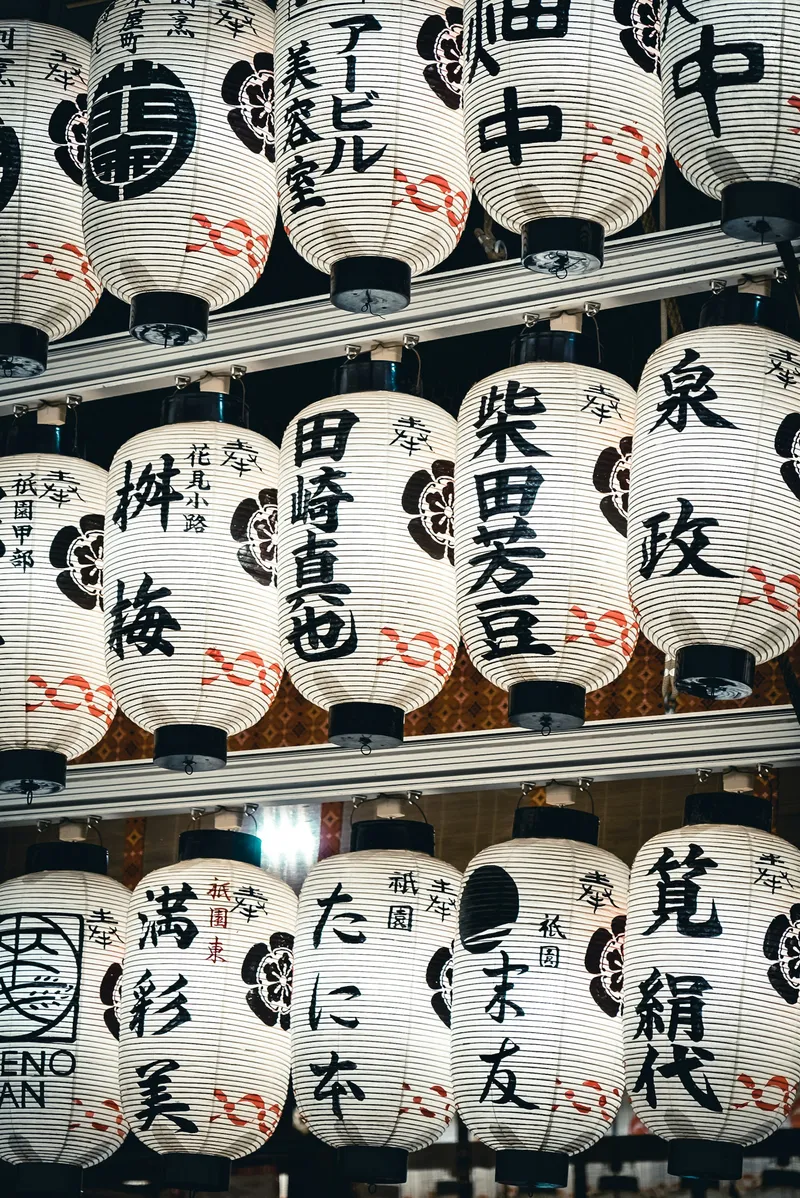What if Gratitude Was Built Into the Grammar?
Another Japanese marvel
Marco Giancotti,

Marco Giancotti,
Cover image:
Photo by Possessed Photography, Unsplash
Language has arbitrary boundaries built into it that we don't even notice, despite using them every day in every form of communication we partake in. This isn't just a cosmetic feature—it affects how we think.
"Sylvia plays tennis, Monopoly, and violin."
This sentence involves a musical instrument and two types of game. ... If one tried to measure the distances between these three concepts by asking people to estimate them, it’s likely that most people would place violin quite a long ways from tennis and Monopoly ... not too surprisingly, this matches the collective choice of Italian speakers, who would translate the above sentence as follows:
"Sylvia gioca al tennis e a Monopoly, e suona il violino."
It would be unthinkable, in Italian, for anyone to play (in the sense of giocare) a musical instrument; the mere suggestion is enough to make an Italian smile. ... While it is natural for English and French speakers to see violin-playing as belonging to the same category as soccer-playing and basketball-playing, the idea would seem downright silly to Italian speakers.
...
Mandarin speakers are considerably more finicky in this matter than Italian speakers: they linguistically perceive four broad types of musical instruments, each type meriting its own special verb. Thus for stringed instruments there is the verb “拉” (pronounced “lā”), meaning roughly “to pull”, while for wind instruments one says “吹” (“chuī”), which means “to blow”. Then for instruments such as the guitar, whose strings are plucked by the fingers, or the piano, whose keys are pushed by the fingers, the verb is “弾” (“tán”) — and finally, for drums, which are banged, what one says is “打” (“dǎ”).
— Surfaces and Essences: Analogy as the fuel and fire of thinking, D. Hofstadter and Emmanuel Sander
Whether your language clumps two concepts together under the same word, or separates them into distinct terms, has implications for what you consider logical and for how similar those concepts seem to you. You see the world a little differently.
The obvious question, then, is what would happen if we could design a "nice" framing into a language? How would it feel to be gently and implicitly steered into positive worldviews by the very rules of your tongue?
You might surmise, for example, that it would be really quite nice to be able to express gratitude with the mere inflection of a verb.
Well, there's no need to surmise: Japanese—that treasure trove of natural linguistic experiments—has precisely that feature!
Built-In Thanks
Take the following English sentence: "Tanaka sold me a book." This represents an action done by one person (Tanaka) toward "me", and that is all we need to know to understand what happened. You can translate this directly into Japanese as follows while retaining its intended meaning:
田中は私に本を売った。Tanaka wa watashi ni hon wo utta.
Tanaka (=topic) me (=recipient) book (=object) sold.
Tanaka sold me a book.
(The last line above is a word-for-word translation, and I'll keep using this format below. The clarifications in parentheses, like "(=topic)", represent the function of grammatical particles like wa, ni, and wo. The important parts to look at are the highlighted words, though.)
The above translation is fine, but in Japanese you can modify any verb to indicate that you're grateful for its occurrence. The auxiliary verb kureru (くれる; kureta in the past tense) exists for this purpose:
田中は私に本を売ってくれた。Tanaka wa watashi ni hon wo utte kureta.
Tanaka (=topic) me (=recipient) book (=object) sell+did me a favor.
Tanaka sold me a book [thankfully].
The concrete contents are exactly the same, and you would usually translate this version to English exactly like the previous one, without clarifying the thankfulness aspect. Yet that transformation of the verb utta (sold) to utte kureta (sell+did me a favor) adds extra nuance—it wasn't just a dry transaction: Tanaka did a kind gesture by selling the book to me.
The kureru form is optional in many cases, such as the one we just saw. Modifying the verb to make a favor explicit in the action is nice, but it could work without it. Other times, though, it is almost obligatory:
報告書を書いてくれてありがとう。Houkokusho wo kaite kurete arigatou.
Report (=object) write+did me a favor thank you.
Thank you for writing the report.
Although the grammar would technically allow you to simply use kaite (write) in this case, it would sound very unnatural. Since you're thanking someone, you are basically required to express your gratitude for their action with kaite kurete (write+did me a favor).
At this point, you might be wondering if this is really so special. After all, in English you can always say things like "she helped me do X" or "he did X for me". And to some extent, you would be right. These English "benefactive" constructs—to use the technical term—do, in some cases, replicate the meaning of kureru sufficiently well. But kureru differs in several key ways.
For one thing, kureru is not just an added word, like "help me" or "for me", but a grammatical inflection of the verb itself. Although kureru exists also as a stand-alone verb meaning "to give (to me/us)", its use as an auxiliary attached to another verb is more abstract than that. In fact, it can even be used with the verb "help" itself:
大丈夫、友達が手伝ってくれるから。Daijoubu, tomodachi ga tetsudatte kureru kara.
(It's) alright, friend (=subject) help+does me a favor (=because).
It's alright, my friend will help me.
If you tried to add the effect of kureru in the translation, you would end up with very weird sentences, like "my friend will help me for me" or "my friend will help me by helping me". In English, one word is enough to clarify the fact that there is (probably) a favor involved, and there is no need to repeat that in another way. In Japanese, on the other hand, you're expected to use kureru precisely because you're mentioning received help.
Kureru as a Cultural Lens

This way of singling out received favors seems to be unique to Japanese, and it is a major hurdle for students of this language before they can reach a near-native level. A study in 2021 compared native Japanese speakers and native speakers of other languages (English, Chinese, Korean, and French) in the way they phrase stories in Japanese. They found that, although all participants were fluent enough to correctly recount those stories, the Japanese natives used ten times as many benefactive forms as English and French participants, and around three times as many as the Korean and Chinese. The way I interpret this result is that even the option of highlighting gratitude through grammar doesn't usually occur to the people of those other countries, even though they probably understand it just fine when listening.
The trickiest part, and another big difference from English, is that you can't use kureru in just any direction. For example, you can't apply it to an action that you have done for someone else, or that your sister has done for a neighbor. Kureru is an expression of gratitude—your gratitude—so it doesn't make sense for any verb that doesn't bring benefit in your direction.
Direction is what matters: is the action coming toward you or emanating away from you?
As soon as you introduce the idea of a direction of benefits, you have to begin thinking about who is closer to you socially and who is farther. A spontaneous order appears. Your family is closer to you than a random passer-by, so it is okay to use kureru to express gratitude when the stranger finds and returns your mother's lost wallet to her. Even if the action is not specifically for your own personal benefit, it does come in your direction—from someone more "outside" your circle to someone relatively more "inside". Thus, the very grammar of Japanese supports the social distinction of uchi and soto, or "in-group" and "out-group".
This uchi-soto difference, and the way language intertwines deeply with the culture of its speakers, is fascinating and worthy of a whole book, but I won't go more in depth than this. Today I'm more interested in something else.
Most of the Japanese teaching materials I've seen stop here, concluding that kureru (and its siblings ageru—more on this below—and morau) are social auxiliary verbs. But, while this is part of what these auxiliary verbs do, it's definitely not the whole story. Treating kureru as merely a reflection of Japanese sociality would be underselling it.
For example, the following sentences are perfectly natural and representative of things natives commonly say (examples from here):
あ,丁度いいところに来てくれた。ちょっと手伝って。A, choudo ii tokoro ni kite kureta. Chotto tetsudatte.
Ah, just right timing (=target) (you) come+did me a favor. A little help me.
Ah, you've come at the right time. Give me a hand.
子どもが寝ていてくれたので,たまっていた仕事が片付いた。Kodomo ga nete ite kureta no de, tamatte ita shigoto ga kataduita.
Child (=subject) remain asleep+did me a favor (=reason), piled up work (=subject) sorted out.
Since my child remained asleep, I was able to sort out the work that had piled up.
At first glance, these may look similar to the previous examples about people helping the speaker or doing something for them. But does "coming at the right time" count as a favor? Is "remaining asleep" an act of benevolence? I don't think so. Kureru is routinely used for actions that are not intentional gestures towards the speaker or their in-group.
It goes further still (examples from here):
Windows Media Player で移すのなら勝手に CD-audio 形式にしてくれる。Windows Media Player de utsusu no nara katte ni CD-audio keishiki ni shite kureru.
Windows Media Player (=means) transfer (=condition) automatically CD-audio format (=target) convert+do you a favor.
If you transfer it with Windows Media Player, it'll automatically [and kindly?] convert it to the CD-audio format.
雨が降ってくれた。Ame ga futte kureta.
Rain (=subject) fall+did me a favor.
It rained [thankfully].
Even inanimate things can dispense favors! (Apparently media players are more "outside" than "you".)
From these examples, you can see that kureru is, first and foremost, a personal expression of gratitude, nothing more and nothing less. This gratitude doesn't need to be directed at people, nor do people use it necessarily to keep tabs on social relationships. It is more intimate than that: it's gratitude towards the Universe, conveniently packaged with your grammar.

The result is that appreciation is a ubiquitous feeling in Japanese language. Not only do Japanese speakers say "thank you" explicitly more often than in English, using the word arigatou (ありがとう), but the grammatical thankfulness of kureru imbues many sentences, especially but not only those related to social relationships.
Flipping It
All of the above sounds wonderful—everyone is thankful!—but is there a flip side to this coin? Should we all rush to implement this same linguistic mechanism in all other languages, too?
I mentioned before another auxiliary verb, ageru (あげる), in relation to the social distinction of uchi and soto. Ageru is the precise directional inverse of kureru: you use it when you, or someone in your in-group, do something in favor of someone "further out" socially.
お母さんがお菓子を作ってあげるよ。Okaasan ga okashi wo tsukutte ageru yo.
Mother (=subject) snacks (=object) make+do you a favor.
Mom will make snacks [for you].
Despite being essentially "kureru with the arrow's direction inverted", this simple difference makes ageru a rather different beast. Unlike kureru, it is not socially safe to use ageru very generously, because you risk sounding condescending. One thing is to err on the side of being too thankful, and quite another is to suggest the other should be grateful to you for something you did—often, that's not for you to decide. Ageru is also used much less frequently in relation to inanimate objects and for unintentional behaviors (although it does happen sometimes).
I find ageru to be less interesting than kureru because it implies a rather standard way of thinking. Outward-facing benefactive forms like ageru are relatively common in other languages, such as Korean and Chinese, even if in less "grammaticized" forms. Most non-Japanese languages tend to have a strong focus on the subject's point of view, regardless of the direction of the action, and ageru follows that same pattern because it's about doing something for someone else. In contrast, kureru is a curious case of seeing an action in a different light simply by being on the receiving end. It feels natural in a language like Japanese, where grammatical passivity is the norm, but it would stand out as rather bizarre in most other tongues.
In case you're wondering, there is another way to "flip" kureru. If ageru involved flipping the direction of a verb's "benefit arrow", yagaru (やがる; becomes yagatta in the past tense) keeps the arrow in the same direction—seeing the action as the receiver—but inverts the sentiment that is involved. Yagaru expresses contempt or disapproval towards some event or act.
Compare this sentence using kureru...
先生が作文を直してくれた。Sensei ga sakubun wo naoshite kureta.
Teacher (=subject) essay (=object) correct+did me a favor
The teacher [generously] corrected my essay.
...with the same sentence using yagaru:
先生が作文を直しやがった。Sensei ga sakubun wo naoshi yagatta.
Teacher (=subject) essay (=object) correct+did me an offense
The teacher [had the nerve to] correct my essay.
With a single twist, the perceived emotion is completely changed.
Fortunately, yagaru is very seldom used. It's so rude that you'll probably never encounter it in the wild outside of manga and yakuza movies, although I suspect it occurs much more frequently inside people's heads, never reaching their lips for etiquette reasons.
![A man with a beard drawn in anime style is on a tv screen. Kusatte yagaru... hayasugitanda. (It's rotting [damn it!]... it was too early.) This character regrets waking up a sleeping god-soldier too early, presumably before it had finished regenerating from past injuries. For some reason, the first part of this sentence from a Studio Ghibli film became popular among fans, and now they use it for anything they despise.](/assets/posts/what-if-gratitude-was-built-into-the-grammar/kusatteyagaru.webp)
There is much more to Japanese benefactives than kureru, ageru, and yagaru. Another verb, morau, is important to express "actively receiving" something. Then there are alternative versions of all these verbs that are appropriate in different social situations. I won't go into any of those details, though. To me, the star of the show is always kureru.
Subliminal Society
Despite decades of academic debate and opposition, the idea that language shapes the way we think is gaining traction again. The affordances and limitations of a language do affect how you and I form and manipulate thoughts. It has even been shown that bilinguals change their worldviews depending on which language they're speaking at a given moment.
Of course, how strong an impact language has on actions is still unclear. Does the explicit distinction Italians make between playing an instrument and playing a game matter for their real-life decisions? Do Chinese violinists all uniformly think in a measurably different way from Chinese flutists?
I'm not sure about any of that, but one thing I'm sure about: to speak natural Japanese, you are required to remain well aware of your group belonging and social distances (uchi vs soto), and also of all the cases in which you are grateful for something happening. Nor are you ever allowed to forget about it, because everyone around you expresses these things in their own words. If you want to join the flock's flight, you'd better flap your wings.
Would an artificial or modified language that includes this kind of benefactive grammar have a positive influence on society? Try living in Japan, and you'll be able to judge for yourself. ●
Cover image:
Photo by Possessed Photography, Unsplash
